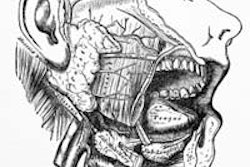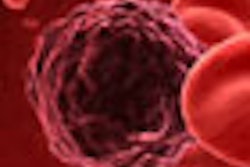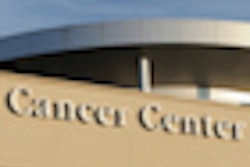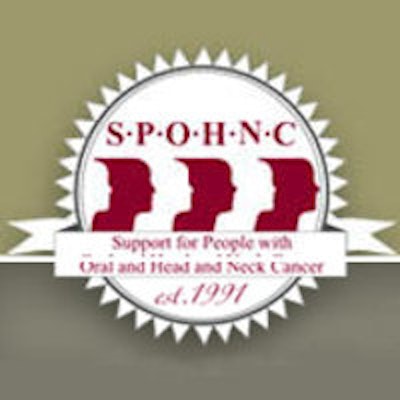
Nancy Leupold founded Support for People with Oral and Head and Neck Cancer (SPOHNC) after she was diagnosed with oral squamous cell carcinoma in 1990. Today, the organization has 127 support groups in 38 states and has published several books with advice for head and neck cancer patients.
We spoke with Leupold, a retired teacher of the deaf who lives in Madison, NJ, about the oral lesion that developed on the floor of her mouth and how it changed her life. Although her stage I cancer didn't require radiation and chemotherapy, Leupold lost 13 teeth and still suffers from xerostomia, has problems eating, and has reduced feeling on the right side of her face.
DrBicuspid.com: How did you learn you had oral cancer?
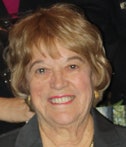 Nancy Leupold, cancer survivor and the founder and president of Support for People with Oral and Head and Neck Cancer.
Nancy Leupold, cancer survivor and the founder and president of Support for People with Oral and Head and Neck Cancer.
Nancy Leupold: It was during a routine dental checkup in 1990. I no sooner got into my dentist's office when he took one look and saw there was something that didn't look right. So he immediately sent me to an oral surgeon who did a biopsy. A week later, I was diagnosed with squamous cell carcinoma on the floor of my mouth. It was in April, which SPOHNC has now designated as Oral Head and Neck Cancer Awareness month.
I was a smoker. I could feel something that wasn't normal on the floor of my mouth, but I didn't know what it was and I couldn't see it.
Fortunately, it was caught early, at stage I. They removed the floor of my mouth and replaced it with a graft from my thigh. I have a scar on my face, but it's not very visible. I still have dry mouth and not much feeling on the right side of my face. They removed 13 teeth and some periodontal tissue. They replaced the teeth with a permanent prosthesis of 11 teeth. I can only chew on the left side of my mouth, and I have to be careful with what I eat.
Fortunately, there's been no recurrence because it was caught early. I didn't require radiation or chemotherapy, but there were some problems with eating and dry mouth.
What prompted you to found SPOHNC?
The big thing for me was this was a time when support groups were blossoming for everything, and yet I couldn't find anybody with the same type of cancer. I had never heard of head and neck cancer. My head and neck surgeon suggested that I start a support group. I also got support from the chairman of dental medicine at the Long Island Jewish Medical Center, where I was treated.
We were nine survivors on that first evening in September 1991. Everybody was nervous, but by the end of the evening, after some tears and smiles, we became friends. I started a newsletter on a small computer that my oral surgeon gave me. Before I knew it, there were people calling from all over. So I set up the organization, and it grew from there. Currently, we have 127 support groups in 38 states.
I'm a retired teacher of the deaf, and I work from my home in Madison, NJ. Right now I'm completing the second edition of a recipe and resource book for people with swallowing challenges.
What do you think is the most important message to get across to the public about this disease?
Early detection is the big thing. People have to get into the habit of getting routine checkups at the dentist. But if you're trying to live on a budget, dental visits often take a backseat. It's very important to maintain good dental practices, such as routine oral exams. I have three daughters who have children, and they all have regular checkups.
What's the biggest misconception about oral cancer?
The growing number of oral cancers cases are among young people who've never smoked or drank. Those things are factors in many cases, but not all of them. The human papillomavirus (HPV) is one of the big factors now.
What's the most important thing that can be done to fight oral cancer?
Awareness. If you feel or see anything suspicious, you should go see your dentist. I couldn't see anything, but I could feel something; it felt like a little pimple in my mouth. Now, in addition to regular visits to my dentist, my head and neck surgeon regularly looks in my mouth, pulls out my tongue, and feels my neck and thyroid. He checks more than just the oral cavity.
There are many oral cancer tests, but the number of positives from screenings aren't very high. Some work well, but they're costly. Your dentist is the best person to check about what looks right and what doesn't. When I was diagnosed, there were only about 17 pages in dental textbooks about head and neck cancer, but knowledge about it has grown tremendously.
What is the greatest challenge in successfully treating head and neck cancers?
Early detection. Treatment is very difficult in the late stages if you need radiation and chemotherapy. Eating and speaking are very social activities, and all of sudden they are curtailed. I can't eat the same as everybody else when I go out, and I have some minor swallowing problems as well.
What kinds of advocacy is your organization involved with today?
We have online resources, several books, and a newsletter. We have a national network of more than 200 survivors who can be contacted by those who want one-on-one conversations through email or in person. They're matched based on diagnosis, treatments, or side effects. We have 127 support groups that meet monthly. There are usually 10 to 25 people in a chapter, but sometimes as many as 40 to 50 people who help and support one another. Visit our website to learn more.
Together with James Sciubba, DMD, PhD, I edited a book that covers diagnoses, treatments, and side effects of oral head and neck cancer: Meeting the Challenges of Oral and Head and Neck Cancer: A Guide for Survivors and Caregivers is in its second edition. It covers many different issues related to a particular type of cancer, including nutrition, speech and swallowing, dental care, insurance issues, and medications. It is a must-read book for newly diagnosed patients and their caregivers, in addition to those who have already been treated.
Multidisciplinary treatment programs to treat oral cancer seem to be growing -- what do you think of this approach?
It's not new; I met with a multidisciplinary team soon after I was diagnosed in 1990. My surgeon, dentist, a social worker, a pathologist, a speech therapist, and others were all involved in my case. I think a multidisciplinary team approach is of utmost importance, as it gives the patient a better understanding of the professionals who will be involved in their care.
Where do you think we will see the next big breakthrough for oral cancer, in treatment or prevention?
They now have the HPV vaccination. Research and treatments have come a long way. SPOHNC recently updated the resources in our books with information about transoral robotic surgery and tomotherapy. There are also some relatively new procedures with radiotherapy. There have been quite a few advances in the treatment of oral head and neck cancer in the last 20 years, and the number of new cases has also decreased. Research is expensive, and it takes a long for completion of a product or method. However, while research progresses, we need to continue strong campaigns in schools and colleges against smoking and alcohol, and encourage HPV vaccinations.
What new treatment do you think shows the most promise for treating oral cancer?
When I was diagnosed, chemotherapy was only used as a palliative treatment. Now different types of chemotherapy, radiation and surgery, including transoral robotic surgery, are being used. Unfortunately, side effects from chemo and radiation are still difficult, and improved quality of life is often compromised. SPOHNC speaks with many head and neck cancer patients who often talk about qualify of life and side effects of treatment, which can be very debilitating. Recovery can be a real struggle for many. We need to find new ways to help improve treatments and quality of life for patients so that they can have a new "normal" life going forward.




